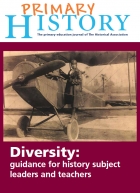Primary Subject Leader Area
Welcome to the HA primary history subject leaders’ area! This area is available exclusively to HA corporate primary members. In this section you will find a collection of guidance pieces created by experienced subject leaders and expert primary educators, sharing their own recommendations for key areas you need to consider as a history subject leader. This gathered intelligence is based on their wealth of experiences and best practice from different contexts.
Each piece contains exemplars and/or further supportive links and, rather than being prescriptive, the idea is that these resources will provide some pointers for you to consider within the context of your own school. If you'd like to take your development of the curriculum and as a leader further you might also like to consider our Chartered Teacher scheme. Read more
-

How the Quality Mark for history can support you as a subject leader
ArticleClick to view -

Working with other subject leaders
ArticleClick to view -

Your first year as a history subject leader
ArticleClick to view -

Helping children to communicate their ideas in primary history
ArticleClick to view -

Addressing misconceptions in primary history
ArticleClick to view -

Progression in primary history
ArticleClick to view -
Resourcing sources
ArticleClick to view -
The Bigger Picture: The Wider World
ArticleClick to view -

Developing local history in your primary curriculum
ArticleClick to view -

Raising the profile of history in your school
ArticleClick to view -

Planning and reviewing primary history
ArticleClick to view -

Writing a History Policy
ArticleClick to view -

Leading History in an Independent School
ArticleClick to view -

The Bigger Picture: Curriculum Overview
ArticleClick to view -

EYFS: What does good curriculum provision look like?
ArticleClick to view -

Primary History Summer Resource 2019: Diversity
ArticleClick to view -

Ofsted: primary guidance 2019
ArticleClick to view

